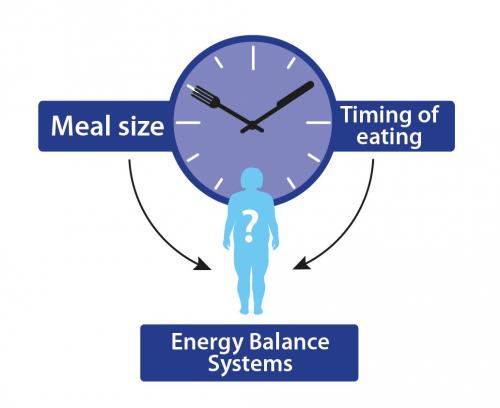Data are sparse on how and why mealtimes, calorie distribution and diet composition throughout the day relate to appetite control and body weight. Most evidence has examined the omission of breakfast (breakfast skipping), which has been linked with negative health consequences.
Breakfast skipping (and late-night feeding) have been associated with an increased risk of obesity. This is supported by several cross‐sectional studies that have identified an inverse association between breakfast consumption and Body Mass Index (BMI) or weight gain. However, this type of data is limited to establishing the cause and/or effect.
A recent meta-analysis of observational studies also demonstrated an association between evening energy consumption and higher BMI. However, more evidence from randomized clinical trials is required to guide public health advice on what and when to eat for body weight control. Our current SEFARI work contributes to that understanding by investigating the importance of the timing of eating.
We know what we eat may affect our risk of heart disease, high blood pressure, type 2 diabetes and obesity. Yet recent nutrition research is showing that when we eat may be just as important for health. This is from the newly evolving field of chrono-nutrition (time of eating). So, does it really matter when you eat your largest meal? Let’s briefly examine of the current evidence:
- There is no clear definition what is considered to be a nutritional breakfast:
We can generally define it as: The first meal of the day that breaks the fast after the longest period of sleep and consumed within 2-3 hours of waking. We live in an ‘obesogenic environment’ (one that promotes weight gain) where the working population eat up to two meals a day at a desk and this often means eating breakfast on the go. Our lifestyle choices associated with eating behaviour and physical activity contribute to the development of obesity. Starting the day with quality nutrition may impact on your food choices later in the day; start as you mean to continue. Although habitual breakfast consumers tend to be leaner, targeting one eating episode (breakfast time) has provided to be largely unsuccessful for weight control. We need to consider the whole diet rather than single foods or meals. An occasional croissant or Danish pastry is not going to make you obese in one meal, but consuming energy dense foods along with a sedentary lifestyle, over time, will.
- Breakfast skippers often miss breakfast to reduce calorie intake as a means to control body weight:
However, what happens mid-morning when you are hungry; do you grab the nearest snack that is ready to eat (that is often high in fat or sugar and calorie dense). Research has shown that habitually skipping breakfast and opting instead to become an evening eater is associated with greater weight gain.
- The type of breakfast we eat is important:
We know from our own work that appetite and satiety are influenced by macronutrient composition. High protein meals are more satiating in the morning (feel fuller for longer) and are more rewarding, making you less likely to give in to food cravings. Examples are high protein yoghurts (e.g. Skyr, Arla, Danio brands); scrambled eggs with oat bread; soft boiled eggs with asparagus ‘soldier dippers’ (instead of toast) or a fruit & vegetable smoothie with added quark or tofu.
Wholegrains from cereals and breads are also an important breakfast food group, as they are a major source of dietary fibre, a nutrient of current public health concern, with UK intake lower than optimal for digestive health. Emphasis on choice should be to opt for wholegrain breads and/or fortified ready to eat cereals to provide at least 3g of fibre per serving. Eating breakfast forms part of a healthy lifestyle and can contribute to successful body weight management.
So how can we assess these claims about what and when to eat? Actually, the truth is that one diet message does not necessarily fit all people. Some people will be able to control body weight better with a big breakfast and some with a large evening meal – therefore the stratification of nutritional advice could be more beneficial to more people.
As we begin to understand the interaction of time of day and metabolism better, we will be able to give more accurate dietary advice to the individual that is not only related to nutritional composition, but also time of eating. Illustrating the need for more chrono-nutrition research to fill in some of the gaps in our knowledge.
Our current work is examining the role of a big breakfast and a small dinner on appetite control, provided as high-protein and high-fibre foods in a volunteer study, where all meals are provided. The study involved 19 healthy participants, as a randomised controlled trial where all food was provided, to assess if a bigger breakfast altered appetite control, energy balance and biomarkers of gut health. In other words, did diet composition affect feeling full and did this affect body weight? A full report on the results will be released later in the year when the study is published. We look forward to sharing the results!
Acknowledgements: This research was funded by Scottish Government through the Strategic Research Programme to the Rowett Institute
